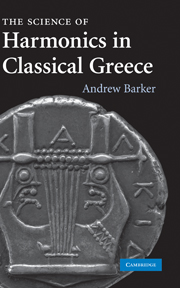Book contents
- Frontmatter
- Contents
- List of figures
- Preface
- Part I PRELIMINARIES
- Part II EMPIRICAL HARMONICS
- Chapter 2 Empirical harmonics before Aristoxenus
- Chapter 3 The early empiricists in their cultural and intellectual contexts
- Chapter 4 Interlude on Aristotle's account of a science and its methods
- Chapter 5 Aristoxenus: the composition of the Elementa harmonica
- Chapter 6 Aristoxenus: concepts and methods in Elementa harmonica Book i
- Chapter 7 Elementa harmonica Books II–III: the science reconsidered
- Chapter 8 Elementa harmonica Book iii and its missing sequel
- Chapter 9 Contexts and purposes of Aristoxenus' harmonics
- Part III MATHEMATICAL HARMONICS
- Postscript: the later centuries
- Bibliography
- Index of proper names
- General index
Chapter 2 - Empirical harmonics before Aristoxenus
Published online by Cambridge University Press: 22 September 2009
- Frontmatter
- Contents
- List of figures
- Preface
- Part I PRELIMINARIES
- Part II EMPIRICAL HARMONICS
- Chapter 2 Empirical harmonics before Aristoxenus
- Chapter 3 The early empiricists in their cultural and intellectual contexts
- Chapter 4 Interlude on Aristotle's account of a science and its methods
- Chapter 5 Aristoxenus: the composition of the Elementa harmonica
- Chapter 6 Aristoxenus: concepts and methods in Elementa harmonica Book i
- Chapter 7 Elementa harmonica Books II–III: the science reconsidered
- Chapter 8 Elementa harmonica Book iii and its missing sequel
- Chapter 9 Contexts and purposes of Aristoxenus' harmonics
- Part III MATHEMATICAL HARMONICS
- Postscript: the later centuries
- Bibliography
- Index of proper names
- General index
Summary
The study of Pythagorean thought, including harmonics, is firmly entrenched in the agendas of several scholarly disciplines, and the writings devoted to it in the last two centuries alone would fill a respectable library. The other style of harmonic analysis mentioned in the Republic, by contrast, has rarely been examined except – briefly – in commentaries on the Republic itself, and by a handful of specialists in ancient musical theory. The force of its exponents' claim to more generous treatment should not be exaggerated; they did not, like the Pythagoreans, pioneer a system of ideas which played a major part in the formation of scientific, philosophical and popular thought for over two millennia. But they deserve more than the occasional learned footnote. Their work broke new ground in the study of music; it casts valuable light on the history of the empirical sciences in the period before Aristotle; and it adds, in small but significant ways, to our knowledge of the environment and the practices of Greek culture between about 450 and 350 bc. In the present chapter I shall be exploring such evidence as we have about the character and content of their contributions to musical knowledge; the discussion will inevitably involve some technicalities, though none of them are alarmingly abstruse.
- Type
- Chapter
- Information
- The Science of Harmonics in Classical Greece , pp. 33 - 67Publisher: Cambridge University PressPrint publication year: 2007



